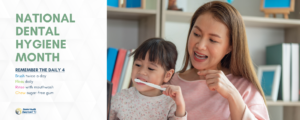
National Dental Hygiene Month
Key Facts
According to the CDC:
- Oral health is essential to general health and well-being.
- The three oral conditions that most affect overall health and quality of life are cavities, severe gum disease, and severe tooth loss.
- 1 in 4 adults aged 20 to 64 currently has cavities.
- Tobacco use and diabetes are two risk factors for gum disease.
This month is dedicated to promoting healthy mouths all across the country, and celebrating the hard work your favorite dental hygienist does to keep your pearly whites squeaky clean.
Good oral/dental health translates to good health overall. Dental problems such as cavities or gum disease can impair your ability to eat and speak properly, cause pain and bad breath. And what many people may not realize, is that poor dental health can have a profoundly, negative affect on areas outside of the mouth, including your heart, diabetes, pregnancy and chronic inflammation, such as arthritis — to name a few.
Reducing the risk of disease
When we have gum disease, the bacteria from our mouth can get into the bloodstream. It then produces a protein which causes the blood to thicken. This means that clots are more likely to form, and the heart is not getting the nutrients and oxygen it needs, resulting in increased risk of a heart attack.
Similarly, gum disease can also cause inflammation of the blood vessels, blocking the blood supply to the brain, leading to a potential stroke.
New research has also shown that we are more likely to develop diabetes if we have gum disease.
Remember of the Daily 4:
Brush
“TWO MINUTES, TWO TIMES A DAY, EVERY DAY.” Brushing for two minutes is the most important method for preventing cavities, gingivitis and other plaque-related diseases.
Floss
MAKE FLOSSING A DAILY HABIT. Flossing daily is essential to maintaining a healthy smile. Flossing removes plaque and food that can’t be reached by a toothbrush. If you don’t floss, you can acquire plaque buildup under the gumline and between the teeth, which can lead to decay and gum disease.
Rinse
USE MOUTHWASH. Rinsing your mouth with mouthwash is another way you can prevent gum disease. All your teeth account for less than half of your mouth, so rinsing with an anti-microbial mouth rinse each day is essential to eliminating plaque and germs.
Chew
FIGHT TOOTH DECAY BY CHEWING SUGAR-FREE GUM. Chewing sugar-free gum after eating helps protect your teeth because it stimulates salivary glands, producing saliva to rid your mouth of bacteria.
Quick Links:
DHD#10 – Oral Health
CDC – Oral Health
